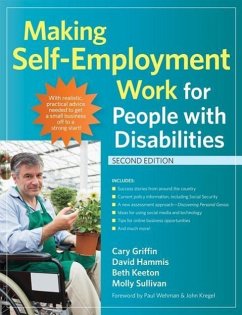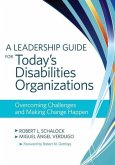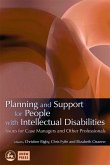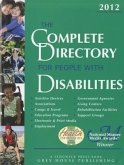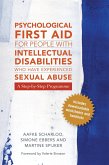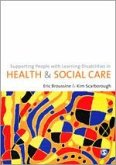Cary Griffin, David Hammis, Beth Keeton, Molly Sullivan
Making Self-Employment Work for People with Disabilities
Cary Griffin, David Hammis, Beth Keeton, Molly Sullivan
Making Self-Employment Work for People with Disabilities
- Broschiertes Buch
- Merkliste
- Auf die Merkliste
- Bewerten Bewerten
- Teilen
- Produkt teilen
- Produkterinnerung
- Produkterinnerung
Updated with a new and improved assessment approach, more self-employment success stories, and the latest on policy changes and online opportunities, this book is your step-by-step guide to helping adults with disabilities get a small business off to a strong start.
Andere Kunden interessierten sich auch für
![A Leadership Guide for Today's Disabilities Organizations A Leadership Guide for Today's Disabilities Organizations]() Robert SchalockA Leadership Guide for Today's Disabilities Organizations49,99 €
Robert SchalockA Leadership Guide for Today's Disabilities Organizations49,99 €![Social Enterprise Social Enterprise]() Malcolm HarperSocial Enterprise62,99 €
Malcolm HarperSocial Enterprise62,99 €![Planning and Support for People with Intellectual Disabilities Planning and Support for People with Intellectual Disabilities]() Planning and Support for People with Intellectual Disabilities63,99 €
Planning and Support for People with Intellectual Disabilities63,99 €![The Complete Directory for People with Disabilities The Complete Directory for People with Disabilities]() The Complete Directory for People with Disabilities231,99 €
The Complete Directory for People with Disabilities231,99 €![Psychological First Aid for People with Intellectual Disabilities Who Have Experienced Sexual Abuse Psychological First Aid for People with Intellectual Disabilities Who Have Experienced Sexual Abuse]() Aafke ScharlooPsychological First Aid for People with Intellectual Disabilities Who Have Experienced Sexual Abuse75,99 €
Aafke ScharlooPsychological First Aid for People with Intellectual Disabilities Who Have Experienced Sexual Abuse75,99 €![Supporting People with Learning Disabilities in Health and Social Care Supporting People with Learning Disabilities in Health and Social Care]() Supporting People with Learning Disabilities in Health and Social Care61,99 €
Supporting People with Learning Disabilities in Health and Social Care61,99 €![Arab American Children with Disabilities Arab American Children with Disabilities]() Jamal M Al KhatibArab American Children with Disabilities28,99 €
Jamal M Al KhatibArab American Children with Disabilities28,99 €-
-
-
Updated with a new and improved assessment approach, more self-employment success stories, and the latest on policy changes and online opportunities, this book is your step-by-step guide to helping adults with disabilities get a small business off to a strong start.
Hinweis: Dieser Artikel kann nur an eine deutsche Lieferadresse ausgeliefert werden.
Hinweis: Dieser Artikel kann nur an eine deutsche Lieferadresse ausgeliefert werden.
Produktdetails
- Produktdetails
- Verlag: Brookes Publishing Company
- 2nd edition
- Seitenzahl: 288
- Erscheinungstermin: 21. Februar 2014
- Englisch
- Abmessung: 278mm x 217mm x 13mm
- Gewicht: 671g
- ISBN-13: 9781598574036
- ISBN-10: 1598574035
- Artikelnr.: 39717026
- Herstellerkennzeichnung
- Libri GmbH
- Europaallee 1
- 36244 Bad Hersfeld
- 06621 890
- Verlag: Brookes Publishing Company
- 2nd edition
- Seitenzahl: 288
- Erscheinungstermin: 21. Februar 2014
- Englisch
- Abmessung: 278mm x 217mm x 13mm
- Gewicht: 671g
- ISBN-13: 9781598574036
- ISBN-10: 1598574035
- Artikelnr.: 39717026
- Herstellerkennzeichnung
- Libri GmbH
- Europaallee 1
- 36244 Bad Hersfeld
- 06621 890
> Mr. Hammis is Senior Partner at Griffin-Hammis Associates, LLC, a full-service consultancy specializing in building communities of economic cooperation, creating highperformance organizations, and focusing on disability and employment. He maintains an ongoing relationship with the Rural Institute at The University of Montana, where he served as Project Director for multiple self-employment, employment, and Social Security outreach training and technical assistance projects, including the Rural Instituteâ (TM)s Rural Entrepreneurship and Self-Employment Expansion Design Project. He works with organizations nationally and internationally on self-employment, benefits analysis, supported employment, and employment engineering. Mr. Hammis has worked in supported and self-employment since 1988 and is personally responsible for the implementation of thousands of Plans to Achieve Self-Support leading to employment, self-employment, and enhanced personal resources for people with disabilities. In July 1996, Mr. Hammis received the International Association for Persons in Supported Employment Professional of the Year Award for his â oeoutstanding support and commitment to people with disabilities, especially in the areas of career development and the use of Social Security work incentives.â Beth Keeton is Senior Consultant with Griffin-Hammis Associates. Beth has worked closely with the state vocational rehabilitation agencies in both Florida and Texas to coordinate the development and implementation of a statewide self-employment certification curriculum. Beth has worked on several other national self-employment projects, including the Entrepreneurship Bootcamp for Veterans with Disabilities, the Iowa Medicaid Infrastructure Grant, the Minnesota Department of Vocational Rehabilitation, and the New York Medicaid Infrastructure Grant, all of which are geared toward increasing the quantity and quality of self-employment outcomes. During her time on the various self-employment projects, she has developed expertise in business plan development and has discovered a particular affinity for financial planning and Social Security benefits analysis. In 2007, Beth completed the Community Work Incentives Coordinator (CWIC) coursework through Cornell University. Under subcontract with Virginia Commonwealth University, she subsequently developed the national CWIC self-employment training curriculum along with additional materials on the incorporation of government funding sources into business financials. In addition, Beth co-wrote Navigating Government Benefits & Employment: A Guidebook for Veterans with Disabilities (Vicks Lithography and Printing, 2013) and was a contributing author in the development of the online course Creating Community Careers and Customized Self-Employment. Beth is also the current Executive Director and Vice Chair on the Board for the Center for Social Capital. Beth earned a B.S. degree in psychology from Clemson University and an M.S. degree in special education from the University of Oregon in 1996. Molly Sullivan has been helping people with disabilities pursue wage and self-employment since the 1990s. She has worked in direct service and program management for nonprofit and government agencies and has provided training and technical assistance to professionals in disability services on innovative employment strategies. Molly has expertise in self-employment and benefits planning. She provided training and technical assistance under the national self-employment demonstration project START-UP/USA, supports veterans participating in the national Entrepreneurial Bootcamp for Veterans with Disabilities, and has supported numerous nonprofit and government agencies in building their capacity to deliver self-employment services. Additionally, she provided training and technical assistance under the Social Security Administration-funded Work Incentives Planning and Assistance National Training Center and has supported numerous nonprofit and government agencies in building their capacity to deliver benefit planning services. Dr. Wehman is Professor of Physical Medicine with joint appointments in the Departments of Rehabilitation Counseling and also Special Education and Disability Policy at Virginia Commonwealth University. He serves as Chairman of the Division of Rehabilitation Research in the Department of Physical Medicine and Rehabilitation. Dr. Wehman has his Ph.D. in Behavioral Disabilities from University of Wisconsin-Madison. As one of the original founders of supported employment, he has worked closely with business and industry since 1980 and has published over 200 articles and authored or edited more than 40 books primarily in transition, severe disabilities, autism, traumatic brain injury and employment for persons with disabilities. He has been the Principal Investigator on 41 million dollars in grants during his career. As the father of two young adults with disabilities, he brings a strong parental as well as business perspective to his work. He is highly active in speaking to professionals, parents, advocates and businesses on transition and employment for people with autism, traumatic brain injury, spinal cord injury and other developmental disabilities. On a daily basis he works with individuals with disabilities, communicates regularly with professionals in the world of business related to disability and diversity, and is active in teaching and mentoring medical students, residents, and doctoral students in rehabilitation medicine, special education, rehabilitation and psychology. A major focus of Dr. Wehman's work is on expanding the partnerships with businesses of all sizes so that more persons with disabilities can gain entrance into the workplace and retain employment successfully. He is a recipient of the Kennedy Foundation Award in Mental Retardation in 1990 and President's Committee on Employment for Persons with Disabilities in 1992. Dr. Wehman was recognized as one of the 50 most influential special educators of the millennium by the Remedial and Special Education journal in December, 2000. He is also Editor-in-Chief of The Journal of Vocational Rehabilitation.

